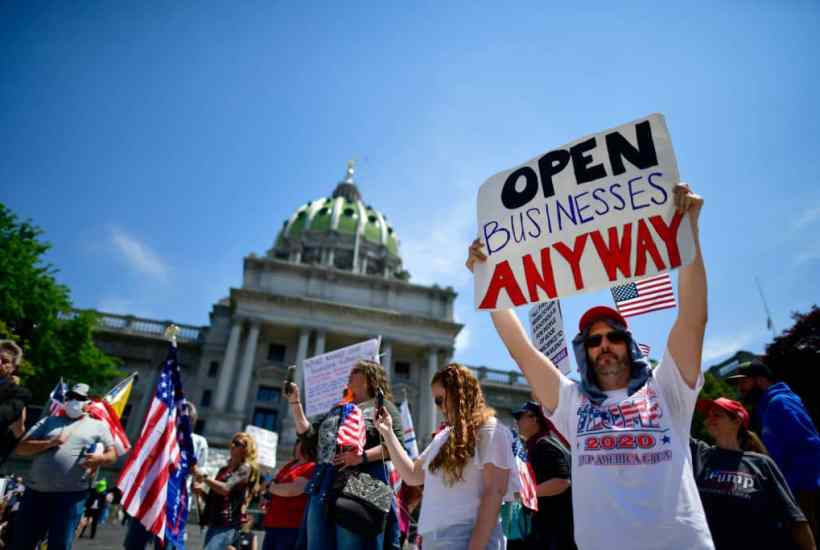If Francis Fukuyama was wrong about the end of history, he was right about one thing. Back in the scary days of March 2020 as the pandemic first hit the West, Fukuyama made one of the few predictions about Covid that turned out to be correct. It would be clear when the pandemic eventually subsided, he said, that ‘the crucial determinant in performance will not be the type of regime, but the state’s capacity, and above all, trust in government’.
A study published this month in the Lancet backs up his theory. It suggests that countries whose citizens trust both their governments and each other have been the world’s big Covid winners. Why? For the simple reason that if you trust each other you protect each other, regardless of whether your government demands two metre social distancing, mask mandates or vaccines.
So in Denmark, where trust is high (54 per cent of Danes says they trust their government), deaths have been low: there have been only around 600 deaths per million people during the pandemic. In the United States, where most people rather sadly say they no longer trust one other on first meeting; only 20 per cent say they trust their government; and 29 per cent say they trust the media, deaths have been horribly high: America has seen the world’s 19th worst Covid mortality, in line with low-GDP Armenia and Argentina. For each million Americans, 2700 people have died.
You might wonder what has gone wrong in the US. The answer begins with the founding fathers. They thought a vibrant free press was so essential that the first US postal rules, in 1792, charged no more than 1.5 cents to deliver a newspaper. It was a rate so far below cost that letter-writers had to be fleeced up to 25 cents to balance the books. The US spent billions of dollars over two centuries on this indirect subsidy of print media. Postal subsidies decreased over the decades, but periodical delivery was allowed to be loss-making well into the 1970s. The result? A vibrant and low-cost media industry. Everyone was a magazine subscriber.
This rather European approach was forgotten, however, when it came to the broadcast era. In 1967, the Carnegie Commission recommended that a public service broadcaster be funded by a tax of five per cent on sales of televisions, which, if in place today would raise annual revenues of £650m. Anyone who has watched the US public service broadcaster, PBS, with its endless, plaintive fundraising appeals, will know the US did not take this advice.
Instead, the US decided full freedom from government interference was the key to preserving the marketplace of ideas; which in turn implied little government-supported media. That might have seemed like a nice idea (and free marketeers may still think it is the right approach). However, the results have not been ideal.
After Ronald Reagan repealed 1949’s Fairness Doctrine, which had sought to instil balance on broadcast media, radio saw the opportunity first. In 1988, Southern conservative radio personality Rush Limbaugh launched a radio show at WABC AM in New York. By 1994, his attacks on ‘commie-libs’, ‘feminazis’ and ‘environmentalist wackos’ had an audience of 20 million Americans on some 650 syndicated stations.
Television soon followed suit. In 1996, Rupert Murdoch launched Fox News under the leadership of Roger Ailes, a Republican media consultant who had also worked as a producer for Limbaugh. The Clintons’ scandals were its first great polarising stories, followed by unstinting support of the ‘war on terror’. It worked: by January 2002, Fox News had higher ratings than the 22-year-old incumbent, liberal CNN.
Next came the internet giants. During the 1980s and 1990s, US news media companies were among the country’s most profitable companies. But they were eaten alive by the technology titans: 20,000 US journalists lost their jobs between 2007 and 2017. On TV and the new social media platforms, radical views attracted the most eyeballs and advertising.
Observing Donald Trump’s candidacy in the 2016 US presidential election, CBS chairman Les Moonves noted it ‘may not be good for America, but it’s damn good for CBS’. It definitely has not been good for America. Polarisation leads to lack of trust. And we know that trust among citizens, trust in government, and trust in media are deeply interlinked. A European Broadcasting Union (EBU) survey found that countries with popular, well-funded public service broadcasters encountered less right-wing extremism, had higher voter turnout and more demand for control of corruption.
All this should be seen as a cautionary tale for the UK, not least since Fox’s owner, Rupert Murdoch, is launching talkTV here this spring. The station promises to be ‘straight and balanced’ (until Ailes’s departure in 2017, Fox News called itself ‘fair and balanced.’) Despite their many faults, our public service broadcasters – the BBC, ITV, Channels 4 and 5 – are still very trusted by viewers. If America’s experience during the pandemic is anything to go on, we need to protect them.
Got something to add? Join the discussion and comment below.
Get 10 issues for just $10
Subscribe to The Spectator Australia today for the next 10 magazine issues, plus full online access, for just $10.



















Comments
Don't miss out
Join the conversation with other Spectator Australia readers. Subscribe to leave a comment.
SUBSCRIBEAlready a subscriber? Log in